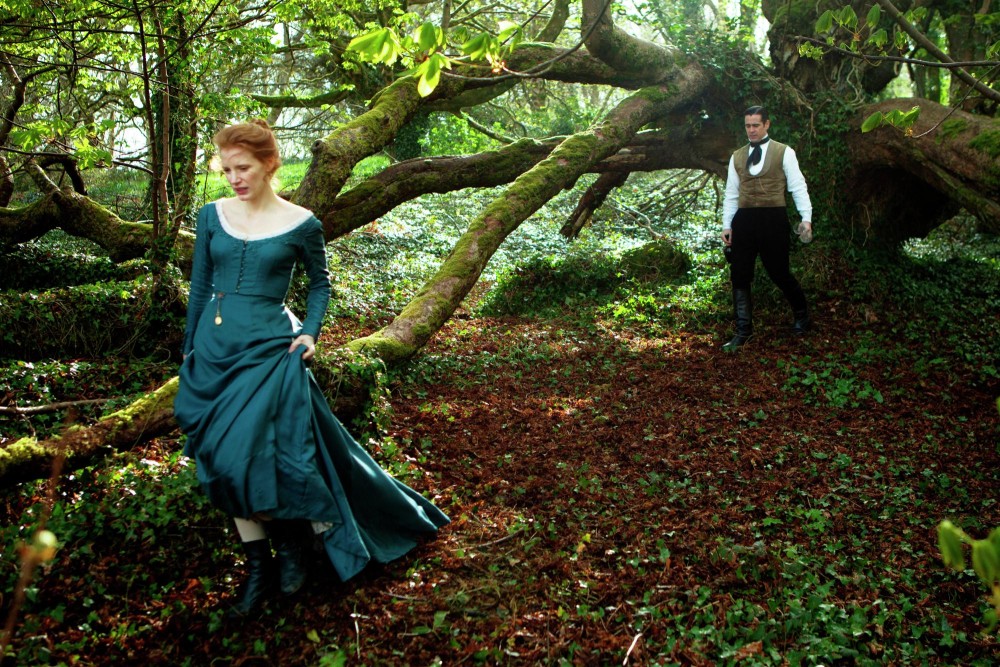
Miss Julie opens with a rather gorgeous showcase of a young woman in her home alone. She looks lonely, and even when she moves out of the lavishly decorated mansion, into the woods she seems to love, she has no one. By no means does she seem at home inside, and watching her outdoors is almost refreshing. Little does anyone know that the moment this young woman walks back into her home, this time older — and presumably wiser — as Jessica Chastain, it’ll begin a series of events that will leave one begging to head right back outside.
That isn’t to say that the entire narrative of Miss Julie, which happens inside of an incredibly claustrophobic series of rooms, is something to want to escape. But August Strindberg’s original play is full of false exists and never-ending back-and-forth dialogue that depicts a sometimes fascinating, and sometimes incredibly frustrating, power struggle. From the get-go, Chastain’s titular character, comes off as a bit of a petulant child; she essentially walks in through the house window exactly the same way she left it. Her father’s valet, John (Colin Farrell), and the woman he’s seeing who also works for them, Kathleen (Samantha Morton), aren’t fans of hers, snidely remarking, “She thinks she can control everyone,” while following her orders regardless.
But sometimes they don’t follow them, or rather, John doesn’t want to. And so begins the constant bickering that fills up Miss Julie‘s over two hour running length. One look at any play translation will show that there is more than enough material shoved in there to parse through and remove, but while writer-director Liv Ullmann adapts the dialogue to fit her actors a little more, she definitely doesn’t cut much. As such, the film ends up being a little too long for its own good, even though Ullmann actually manages to bring in visual flourishes that the stage play never could; close-ups, sweeping movements, lovely framing of both its performers and simple yet solid production design, and most importantly, the ability to actually exist outside of a singular room.
Regardless of its sometimes-tiresome nature, what is interesting about Strindberg’s play is the way it aptly presents class difference during the period and does so through two characters who are practically reprehensible. There’s little to nothing to like about the two, and yet it’s far easier to sympathize with the misguided Julie, as her character is clearly a sheltered woman who more than likely suffers from depression. And yet, Morton’s Kathleen is the only one who comes off as well-balanced; a woman well aware and comfortable in her social status. Because of the repetition of the narrative though, they’re only so interesting to watch (up until the last act kicks in and things get pretty wild).
What Miss Julie does offer these characters, or more specifically these actors, is the chance to pop on screen, sometimes audiences prone to watching damn fine actors doing their thing will eat right up. It’s all about Chastain and Morton in this film, one giving a performance that sways from restrained to intense and the other keeping it cool and sharp all the way through. It’s because of these actresses (and I guess its actor, although I remain unconvinced of Farrell’s acting skills post-Miami Vice), as well as Liv Ullmann’s knack for filming (but not so much adapting) a play that, ultimately, isn’t as strong as it wishes it was, that Miss Julie is actually worth a watch.
—
Directed by Liv Ullmann; written by Liv Ullmann; based on a play by August Strindberg; starring Jessica Chastain, Colin Farrell, Samantha Morton & Nora McMenamy; 129 minutes.
Miss Julie is currently undergoing a limited US release.



 Derek
Derek
 Isabelle
Isabelle